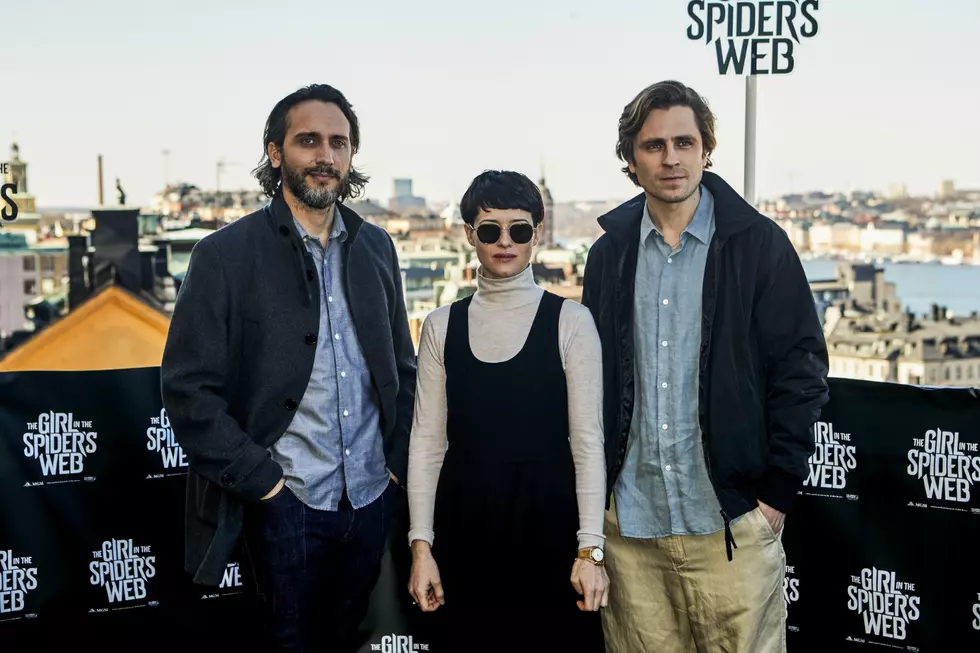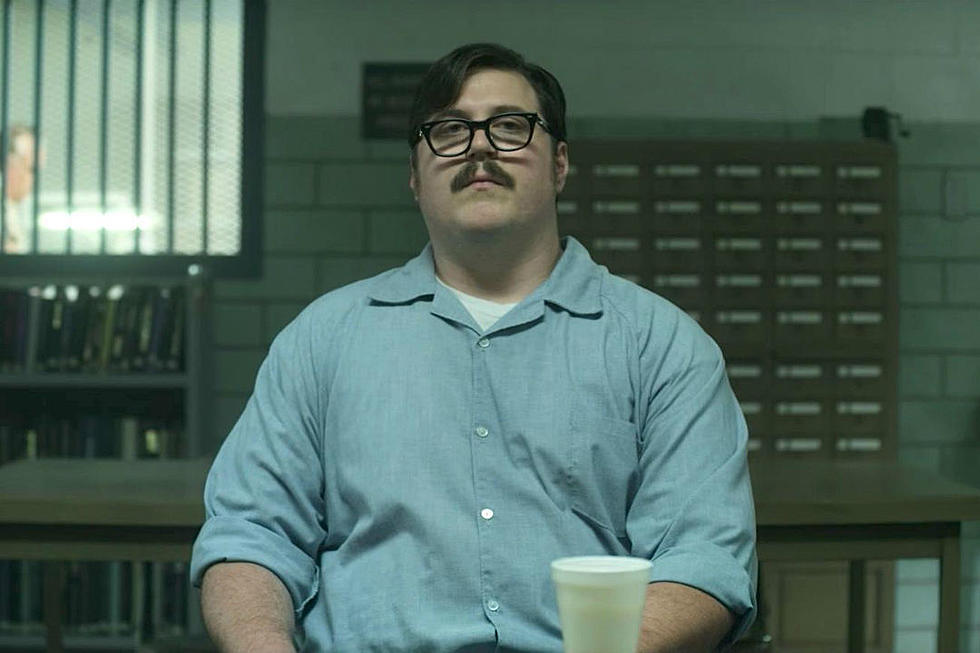
‘Don’t Breathe’ Director Fede Alvarez on Stephen Lang, Audience Reactions and Why Trailers Can’t Ruin Movies
Three years after delivering his visceral remake of Sam Raimi’s Evil Dead, director Fede Alvarez returns with Don’t Breathe, an inventive new thriller that puts a nasty spin on the home invasion genre. Alvarez’s latest follows three amateur criminals that get way more than they bargained for when they target the home of a reclusive blind man, played by the intimidating Stephen Lang. I had a chance to speak with Alvarez before a recent screening in Austin, Texas, where he discussed the making of his new film, Lang’s crucial role, and whether he thinks movie trailers are too revealing.
A twisted, devious horror thriller that unnervingly borders on downright unpleasant, Don’t Breathe is a relentless experience rife with dreadful twists and turns that will put you on the edge of your seat and hold you hostage there until it’s over. I began my chat with Alvarez by inquiring about a few of the basics, including working with Lang, which inspired a lively discussion about the criticisms of that casting, his responsibilities as a filmmaker, and where morals fit into horror (spoiler: they don’t):
Don’t Breathe is a pretty interesting inversion of your usual home invasion story. Was that sort of your initial idea?
With my co-writer Rodo [Sayagues] we wanted to tell a story about thieves. It was always something we had in the back of our heads because I think thieves — in particular, people who break into houses and take your laptop — are just characters that people love to hate, right? They say horrible statements about them like, “We should kill them all!”
…Do people say that?
Horrible, fascist stuff like that. And I think it was kind of a challenge to say OK, can I tell a story about them and not get you to like them, but empathize with them and why they do the things they’re doing. And of course giving them a powerful antagonist that would be cinematic and bring to life something that could really transcend. That’s how the basic elements came about — it’s going to be about these kids going into this house with this blind man who has a secret, and we don’t know what it is. That was kind of intense in itself, that idea, and setting it in Detroit, which was something that happened very quickly, because we knew that the story needed to happen on a suburban street. We didn’t want to put it in an isolated cabin in the woods, or something like that, so we thought, where can we find a house that’s on a suburban street, but there’s nobody there.
That setting doesn’t feel typical, but neither does the film.
It was interesting how everything was kind of reversed in this movie, [with] home invasions you usually have the perfect American nuclear family and a house and they get invaded by some creeps. So we thought, let’s do it the other way around and have the invaders be the lead characters, and Detroit did that for us as well. It’s a creepy street — usually in horror movies you have the beautiful street with the creepy house, and that’s the house you don’t go into. Or it’s the other way around with the creepy street and the one that’s in good shape, and that’s the scary one. Everything was approached from that point of view. The more you play against cliches and stereotypes, the more room you have to surprise your audience, and put them in a place where they have no idea what’s going to happen.
The Blind Man feels like a role written specifically for Stephen Lang. Was he someone you thought of early on?
Oh yeah. It was one of those guys where when you start seeing names and trying to think of who that could be, as soon as I saw his name I went, oh, this is great. It’s too perfect to be true. It was exactly how it was described in the script, and believe me, you don’t get a lot of actors like him who are 65 and in such incredible shape.
He’s just ripped. And intimidating.
And that’s not just for the looks. You need that in the story, otherwise the audience starts saying, “He’s just blind. Just sneak up on him and just choke him, or something.” But nobody is giving that advice to the characters in this movie. You want to make sure he doesn’t know that you’re there because he’s a lethal weapon. But it was important also that it was a guy of that age because in the first part of the movie you feel sorry for him and you’re conflicted about everything that’s happened.
He’s also a very committed actor. Did you see his campaign to play Cable in the Deadpool sequel?
Oh, yeah!
He can’t now, of course, because he has to make like, four Avatar sequels instead.
[Laughs] Yeah, f— that.
From what I understand, he was pretty intense on your set.
Oh, he’s the best. Veteran actors are the best. The younger ones are the ones who drive you mad, usually. Veterans, there’s a reason why they’re still acting and making movies — they’re great to work with and they know what they’re doing. And this guy’s a stage actor, so imagine making this movie, he was wearing these contact lenses that really blind him. He wasn’t faking that blindness. He couldn’t see much with those because they impaired like, 70 percent of his sight, and with the low conditions, that was an extra 20, so he couldn’t see anything. But still amazing. He would run and stop the moment he has to stop and hit his mark, which, you know, with this movie and the camerawork that we do, if he doesn’t hit his mark it’s out of focus and the whole thing doesn’t work.
Some articles about the trailers for Don’t Breathe come with spoiler warnings — usually written by someone who saw the film earlier this year. As the director, do you feel that the trailers reveal too much?
I’m responsible for the trailers, as well. I’m the main producer of the film, so I’m super involved with that. I never went to see a movie and said that the trailer ruined it for me, or I would’ve liked it if it weren’t for the trailer. Bad stories ruin movies. Bad characters ruin movies. Bad endings ruin movies, sometimes, at the last second. Bad CGI ruins movies. The trailer doesn’t ruin the movie. I don’t even remember being in a movie and going, “Oh, shit, I saw that already!” Maybe…
Out of context those scenes don’t really make any sense.
What happens to all of us when we’ve seen the movie before anybody else, you watch the trailer after the fact and go, “Come on, they’re giving away the whole movie.” But I would advise you to go and watch the trailer for whatever movie you love, like The Exorcist. They even show Father Karras jumping out of the window. They show everything. When you watch The Exorcist for the first time, you don’t know if she’s possessed, it’s actually the big mystery of the movie, like is she really a monster? And in the trailer they show you everything — throwing up, stabbing her vagina, everything. But does that ruin the movie?
No.
What that does is make you want to see the movie. That’s what our trailers are doing. People who have seen the movie they say, “Oh my god, they’ve just given it away.” But the things that we’re showing are shown so quickly that you don’t really get to see what it is. People figure it out, but they don’t know exactly what the story is behind it. But they’ll find out next week.
[Warning: The next part of this interview features a SPOILER from the third act of Don’t Breathe. You may not want to read on until after you’ve seen the film.]
Speaking of spoilers and things that could potentially ruin a movie, there’s a moment in the third act of Don’t Breathe that almost turned me off of the film completely. I think you know what it is.
[Laughs] I know the moment. We can talk about it if you want.
It’s the moment when Stephen Lang’s character goes after Jane Levy with a turkey baster. I’m not easily rattled, but that scene almost crosses a hard line that I wasn’t even aware I had until that moment…
Why? Tell me why.
Because it feels unnecessary. You have a film that’s already relentless in what it throws at these characters, and by virtue of that, your audience. I don’t feel as though it needs the threat of a violent act that is so specific to the gender of the character, who wouldn’t be in that particular position if she were a man. The film is intense enough without the threat of sexual violence — which doesn’t tell me anything you hadn’t already conveyed through other means.
There was no actual violence. It was more the concept of what was about to happen. It never happens, right?
Right, it’s the threat of, not the actual act. And if he had succeeded in assaulting her, the film would have totally lost me.
He doesn’t get there. He’s just talking, just saying what he’s going to do, which drives you crazy.
He gets really close, though!
But he doesn’t do it.
He doesn’t do it.
The way I think, if there’s violence against anyone in this movie, it’s the men. They get all f—d up, and she’s the one who gets it easier than anyone else. I was very careful about that. I like to treat my characters as if they have no gender. Man, girl, doesn’t matter. And actually what I do, gender comes in play when the story needs it, like in particular when they find that girl, right? [Dylan Minette’s character] is like, “I’m out of here,” but she knows how terrifying that it is and has an empathy that a guy will never have. That’s why she decides to turn around and help her. Gender plays a part in that, but I know what you mean, and I completely agree. That’s exactly what I wanted to do. I wanted people to go, “F—, I’m out of this theater!”
I was very close to that.
While you’re doing that, there’s some other people in the audience going, “I might fall in love with this movie. This is amazing.” That’s how those scenes always work. Again, like stabbing the vagina in The Exorcist, I’m sure a lot of people were like, “I’m out. ‘F— me, Jesus’? No way.” Doesn’t matter, it’s a masterpiece, and when people see that they think this director is daring to do something. And I’m not comparing — that’s a masterpiece, there’s no point in comparing. What I mean is that the genre, at least my favorite movies, do usually have a scene or something that is divisive between the audience, and some people are going to go, “I didn’t need that, I’m out,” and some people will just love it. And that’s been my experience with this one. Some people will come up and just thank me for that scene, and the reality of it is that, I don’t know, that movie just taps into your brain.
It definitely hits a nerve.
It’s taboo and I love it. If that guy had a knife and said, “I’m gonna gut you now because of what you’ve done,” people would be just texting like they don’t give a f—. If it’s a knife dripping blood, OK, whatever. But it’s a turkey baster dripping semen, and everybody lost their minds. I watched that movie with an audience and when the baster goes to the mouth, that’s the biggest reaction. People jumping in their scenes and gagging, come on.
Having her turn the tables is such a relief because, like I said, if it had gone the other way, I would’ve been out.
That’s the beauty of it. And it was a worthy payback. She deserved that, and the audience deserved that. When we had the test screenings with the video to record audience reactions, you can see during that scene that every girl in the audience goes, “Oh, f— yeah!” and every guy is like, “Oh my god, no, no, no.” There’s something very special about that, but look, getting a big reaction out of an audience is always a challenge. Most audiences are indifferent, they don’t care at all.
Speaking of reactions, you were here at SXSW a few years ago with Evil Dead, and that premiere was one of the most uncomfortable screenings I’ve ever attended because of the way the audience reacted during the “tree rape” scene.
Which is not my invention, of course.
Sam Raimi has said he regrets putting that scene in the original film. He called it “unnecessarily gratuitous.”
I wasn’t gonna put it there, but then they [told] me, “You need to have the tree rape.”
That seems like a really weird directive.
Well, it came from up top.
I’m not saying it’s your fault, necessarily, but when the majority of the audience is openly cheering a sexual assault on screen, it does make me wonder where the filmmaker’s responsibility ends.
Right.
I get that they’re cheering the recognition of a memorable moment from an iconic film, but it’s still a rape scene, and it’s troubling that people are nostalgic about it and let that nostalgia overtake their morality.
Well, it’s two things. It’s an iconic moment, and it was at that theater — it wasn’t at every screening of that movie. Also the fact that what I tried to do in that scene, honestly, and what Sam was conflicted about in the original — if you watch the original movie, when she gets raped by the tree, the way she performs is almost like at first it hurts but then she kind of enjoys it? And that was horrible. Nobody would enjoy that. In my scene, at least, you gotta admit that she’s not enjoying it. Not one bit. It’s painful as f— and it’s horrible, and that’s what it is. At least at that level it’s an accurate representation. And part of it is in her mind because that wouldn’t be physically possible, what happened. So it is supernatural. It’s just a nightmare. A physical representation of a nightmare.
Ironically enough — and this is very bizarre — when we tested the film, you usually get numbers and reactions to specific scenes to get a very clear idea of who liked what. Among females younger than 25, [it was their] favorite scene in the movie. I’m just telling you the number, I don’t even know what that means.
Well, that I sort of get because when I was a horror fan in my early 20s, I would seek out “endurance horror” — the kind of stuff that really tests your limits. Cannibal Holocaust, Nekromantik, that sort of thing.
Yeah, yeah! This is where I think movies are dangerous, and will agree with you on some ethical level, is when you’re doing something like [the tree rape scene] to send a message of like, “Do this, women actually will dig it.” And in my scene it’s very clear that she won’t dig it. So there’s no crazy guy who can go out there and rape someone inspired by the movie. Nobody did that.
Sure.
But look, if one day ethics start to get into the horror genre, the genre’s dead. As long as filmmakers don’t start thinking, “That’s incorrect. This will offend people.” I mean, in the last two days, I never try to get into this discussion — it’s never the community, it’s always like, three guys in the disabled community just like, hating us because we didn’t cast a blind person to play The Blind Man [in Don’t Breathe]. And then I ask myself if I’m an ethical director or not, but then I tell them, look, the horror genre is all about not being like that. It’s about transgression and doing things that other genres cannot do and how the audience reacts. And this is why I never want to engage in those discussions because if he has to be blind, then he also has to be a war veteran because I’m sure not a lot of veterans get opportunities in Hollywood. So it has to be a war veteran and he has to be blind, and it also has to be someone who wasn’t born blind because that would be unfair to guys that lost their sight, like that guy. So then there’s no movie, right? Because you’ll never find that person. [Stephen Lang] is a professional actor at the level that I need.
So ethics and horror movies, they just never really mind each other. If that’s the kind of movie you want and you’re a very ethical person who’s looking for an ethical movie, then you shouldn’t go watch a horror movie. I mean, you watched Cannibal Holocaust.
Yeah, but I’m also the rare weirdo who thinks Cannibal Ferox is better, so what do I know?
You’re definitely not one of those ethical people.
More From ScreenCrush









